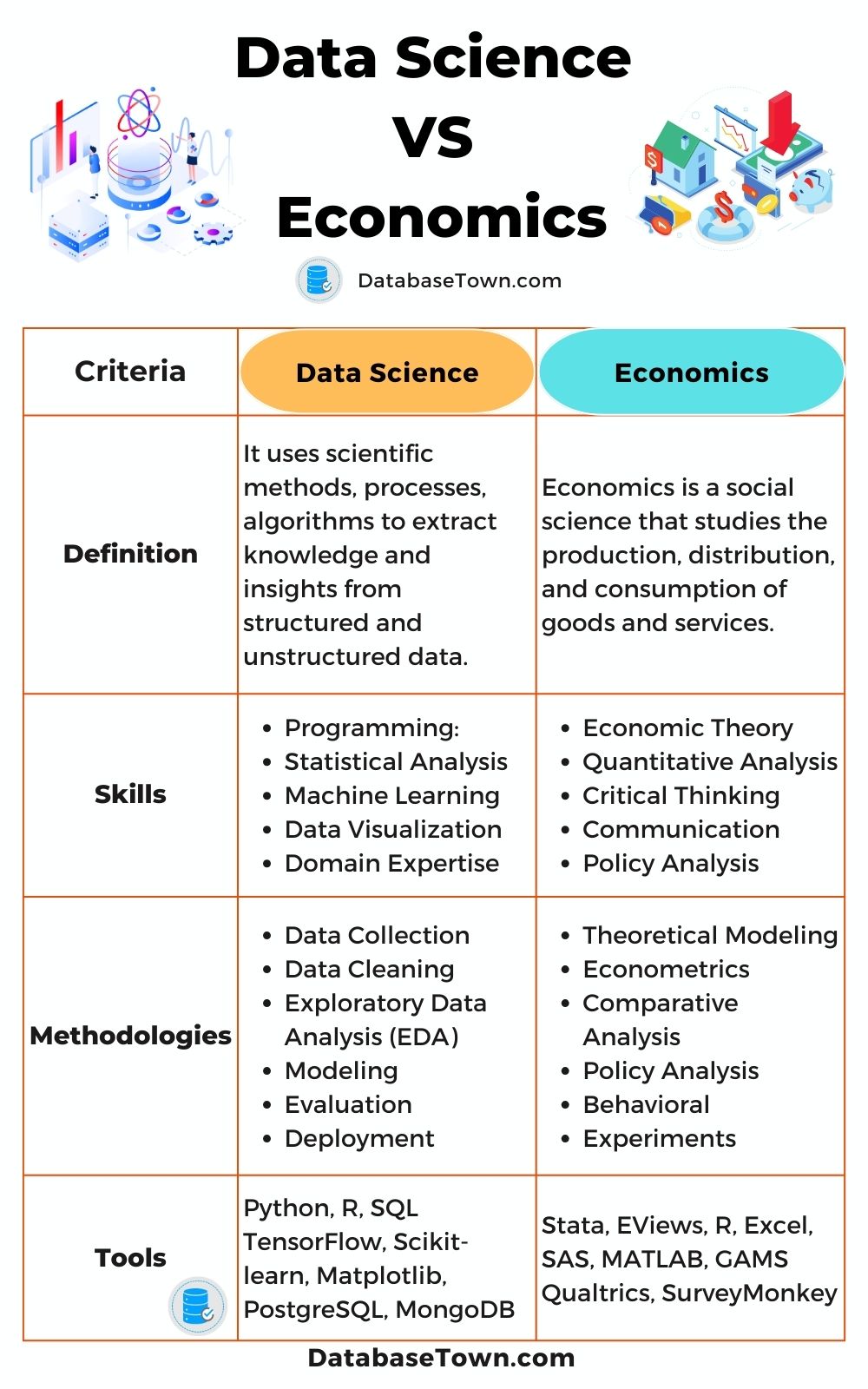
Data Science and Economics are two unique but somewhat interrelated fields. Both involve the analysis of data to understand and predict behaviors, trends, and outcomes.
However, they differ in their approaches, tools, and applications. In this post, we’ll discuss the key differences between Data Science and Economics.
Definitions
Data Science
Data Science is an interdisciplinary field that uses scientific methods, processes, algorithms, and systems to extract knowledge and insights from structured and unstructured data.
Economics
Economics is a social science that studies the production, distribution, and consumption of goods and services. It focuses on understanding how individuals, businesses, governments, and nations make choices about allocating resources.
Historical Background
Data Science
- 1960s-1970s: Early development of statistical and computational methods.
- 1980s-1990s: Growth of machine learning and database technologies.
- 2000s-Present: Explosion of big data, advanced analytics, and artificial intelligence.
Economics
- 18th Century: Adam Smith’s “The Wealth of Nations” lays the groundwork for modern economics.
- 19th Century: Development of classical economics by David Ricardo and John Stuart Mill.
- 20th Century: Emergence of key schools of thought, including Keynesian, Neoclassical, and Behavioral Economics.
Methodologies
Data Science
There are variety of Data Science methodologies and covers these techniques:
- Data Collection: Gathering data from various sources.
- Data Cleaning: Removing noise and inconsistencies.
- Exploratory Data Analysis (EDA): Understanding data distributions and relationships.
- Modeling: Applying statistical and machine learning models.
- Evaluation: Assessing model performance.
- Deployment: Implementing models in real-world applications.
Economics
Economic methodologies focus on theoretical and empirical analysis:
- Theoretical Modeling: Developing abstract models to describe economic phenomena.
- Econometrics: Applying statistical methods to test hypotheses and estimate relationships.
- Comparative Analysis: Studying different economic systems and policies.
- Policy Analysis: Evaluating the impact of economic policies.
- Behavioral Experiments: Understanding decision-making processes.
Tools and Technologies
Data Science
Data Scientists utilize various tools and technologies, such as:
- Programming Languages: Python, R, SQL
- Libraries and Frameworks: TensorFlow, Scikit-learn, Pandas, NumPy
- Data Visualization: Matplotlib, Seaborn, Tableau
- Big Data Technologies: Hadoop, Spark
- Databases: MySQL, PostgreSQL, MongoDB
Economics
Economists typically use:
- Statistical Software: Stata, EViews, R
- Data Analysis Tools: Excel, SAS
- Economic Modeling Software: MATLAB, GAMS
- Survey Tools: Qualtrics, SurveyMonkey
- Databases: World Bank, IMF, Eurostat
Applications
Data Science
Data Science applications span multiple industries:
- Finance: Fraud detection, algorithmic trading
- Healthcare: Predictive diagnostics, personalized medicine
- Retail: Customer segmentation, recommendation systems
- Marketing: Sentiment analysis, targeted advertising
- Technology: Search engines, speech recognition
Economics
Economics applications are critical for policy and business decisions:
- Public Policy: Taxation, welfare programs
- Business Strategy: Pricing, market analysis
- International Trade: Trade agreements, tariffs
- Labor Economics: Employment trends, wage analysis
- Environmental Economics: Resource management, sustainability policies
Skills Required
Data Science
Key skills for Data Scientists include:
- Programming: Proficiency in languages like Python and R.
- Statistical Analysis: Strong understanding of statistical methods.
- Machine Learning: Knowledge of algorithms and model building.
- Data Visualization: Ability to create insightful visual representations of data.
- Domain Expertise: Understanding the specific industry they work in.
Economics
Key skills for Economists include:
- Economic Theory: Deep knowledge of microeconomics and macroeconomics.
- Quantitative Analysis: Proficiency in econometrics and statistical analysis.
- Critical Thinking: Ability to analyze and interpret economic data.
- Communication: Skill in presenting findings to non-technical audiences.
- Policy Analysis: Understanding the implications of economic policies and their impact on society.
Educational Pathways
Data Science
Educational pathways for Data Science often include:
- Undergraduate Degree: Computer Science, Statistics, Mathematics, or a related field.
- Graduate Degree: Master’s or PhD in Data Science, Machine Learning, or related areas.
- Certifications: Specialized certifications such as Certified Data Scientist (CDS).
- Bootcamps: Intensive, short-term training programs focused on practical skills.
- Online Courses: Platforms like Coursera, edX, and Udacity offer courses in Data Science.
Economics
Educational pathways for Economics typically include:
- Undergraduate Degree: Bachelor’s in Economics or a related field.
- Graduate Degree: Master’s or PhD in Economics.
- Specializations: Fields such as Development Economics, Behavioral Economics, or International Economics.
- Professional Certifications: Chartered Financial Analyst (CFA), Certified Economic Developer (CEcD).
- Online Courses: Various platforms offer courses in Economics, including Khan Academy and MIT OpenCourseWare.
Career Opportunities
Data Science
Data Science offers a wide range of career opportunities. Some are mentioned below.
| Job Title | Description | Average Salary (USD) |
|---|---|---|
| Data Scientist | Analyzes complex data sets to gain insights and build predictive models. | $120,000 |
| Machine Learning Engineer | Develops algorithms and models that enable machines to learn from data. | $130,000 |
| Data Analyst | Interprets data and provides actionable recommendations to stakeholders. | $70,000 |
| Data Engineer | Designs and maintains data pipelines and architectures. | $110,000 |
| Business Intelligence (BI) Analyst | Uses data to help businesses make informed decisions. | $85,000 |
Economics
Economics also offers diverse career paths:
| Job Title | Description | Average Salary (USD) |
|---|---|---|
| Economist | Analyzes economic issues and trends to provide insights and policy recommendations. | $100,000 |
| Financial Analyst | Evaluates financial data to assist in investment decisions. | $85,000 |
| Policy Analyst | Studies and evaluates the effects of public policies. | $75,000 |
| Economic Consultant | Provides expert advice on economic matters to businesses and governments. | $95,000 |
| Research Analyst | Conducts detailed research and analysis on economic topics. | $70,000 |
Case Studies
Data Science Case Study: Predictive Maintenance
Company: General Electric (GE)
Problem: High maintenance costs and downtime in industrial equipment.
Solution: GE implemented a Data Science solution to predict equipment failures before they occur. Using sensor data and machine learning algorithms, they developed predictive maintenance models.
Outcome: Significant reduction in maintenance costs and equipment downtime, leading to increased operational efficiency.
Economics Case Study: Universal Basic Income (UBI) Analysis
Research Institution: Stanford University
Problem: Evaluating the economic impact of implementing a Universal Basic Income policy.
Solution: Economists at Stanford conducted a comprehensive analysis using economic models and empirical data to simulate the effects of UBI on labor markets, poverty rates, and government budgets.
Outcome: The study provided valuable insights into the potential benefits and challenges of UBI, informing policymakers and public debates.







